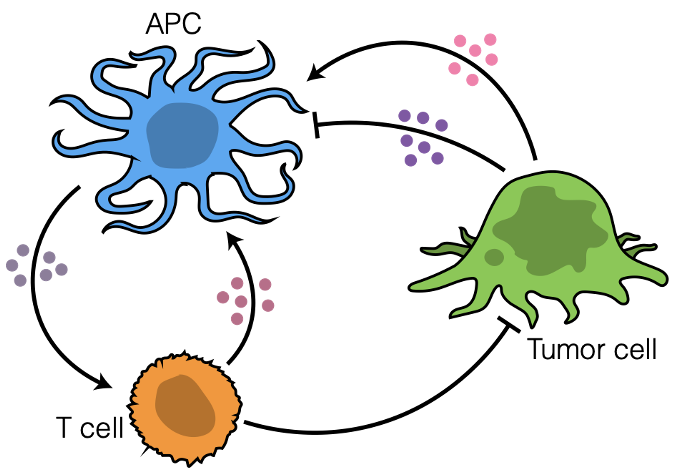JOIN THE TEAM
The group of Ashley Laughney at Weill Cornell Medicine in New York City, is seeking innovative and highly motivated postdoctoral researchers to study inter-cellular communication in the tumor microenvironment (TME) and the context-dependent functions of pleiotropic proteins during cancer progression.
Who are we? A highly interdisciplinary team that tackles the genotype-to-phenotype problem (how does sequence map to function) in cancer. Time and time again, we see that activation of the very same pathway can give rise to anti-tumor and pro-tumor functions at different stages of cancer progression (Nature 2023). Or that activation of the same oncogene doesn’t act like an oncogene anymore when in the wrong cell of origin (Science 2024). Our goal is to develop modular, systems biology approaches to unravel the context-dependent functions of pleiotropic regulators and emergent multicellular programs in cancer evolution.
What do we do? We combine high-throughput single cell sequencing with development of new computational tools, synthetic biology approaches and cancer models, to understand how the same genome-encoded components can give rise to diverse phenotypes, or cell functions, at different stages of disease progression.
What are we looking for? One way in which cells adapt diverse functional responses is through context-dependent interactions with their microenvironment. Cells typically send messages to their microenvironment by emitting ligands, which bind to complimentary receptors on the surfaced of target cells; then triggering a change in the behavior of the target cell. Complimentary ligand-receptor-pairs are well annotated and methods have been developed to infer cell-cell interactions from single cell expression data based on their mutual expression. However, existing work views each cell as an independent unit. We have taken the alternative view that cells sampled from the same tumor microenvironment (TME) are fundamentally participating in an underlying biological process and are working towards generating a principled understanding of how cells coordinate their behavior; which has the potential to unlock deep biological insights into cancer progression, and suggest new targets for effective treatments. The successful candidate will be highly independent and benefit from a background in: deep learning and graphs, variational inference, dynamical systems, network analysis, computational/systems biology. Cellular function is also complicated by the frequency of pleiotropy found in biological systems; that is when one gene influences many traits. We are developing modular high-throughput technologies to map the function of each building block (or residue) of a protein at scale in different contexts. Towards this, we are recruiting candidates with expertise in functional genomics, synthetic biology and protein degradation/trafficking. No background in cancer biology is necessary! We value learning from individuals that come from diverse training backgrounds.

Multiple positions are fully supported by NCI funding and build upon the exceptional resources and community of three of New York City’s premier research institutions: Weill Cornell Medical College, The Rockefeller University and Memorial Sloan Kettering Cancer Center. We offer competitive benefits and access to subsidized Cornell housing.
Interested applicants should email the following items as a single PDF to LaughneyLabPositions@gmail.com: (1) cover letter indicating research interests and reasons for applying, (2) your curriculum vitae, (3) names and contact information for three references and (4) up to two reprints. Postdoc applicants should additionally arrange for three letters of reference to be emailed directly to LaughneyLabPositions@gmail.com.
Weill Cornell Medicine is a comprehensive academic medical center that’s committed to excellence in patient care, scientific discovery, and the education of future physicians in New York City and around the world. Our doctors and scientists-faculty from Weill Cornell Medical College, Weill Cornell Graduate School of Medical Sciences, and the Weill Cornell Physician Organization-are engaged in world-class clinical care and cutting-edge research that connect patients to the latest treatment innovations and prevention strategies. Located in the heart of the Upper East Side’s scientific corridor, Weill Cornell Medicine’s powerful network of collaborators extends to its parent university Cornell University; to Qatar, where an international campus offers a U.S. medical degree; and to programs in Tanzania, Haiti, Brazil, Austria and Turkey. Our medical practices serve communities throughout New York City, and our faculty provide comprehensive care at NewYork-Presbyterian Hospital/Weill Cornell Medical Center, NewYork-Presbyterian/Lower Manhattan Hospital, and NewYork-Presbyterian/Queens. At Weill Cornell Medicine, we work together to treat each individual, not just their conditions or illnesses, as we strive to deliver the finest possible care for our patients – the center of everything we do. Weill Cornell Medicine is an Equal Employment Opportunity/Minorities/Females/Vet/Disabled employer.
